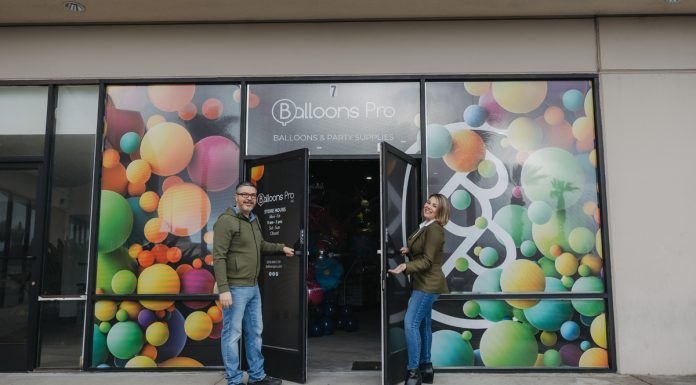Some small business owners on Third Avenue are at odds with the city of Chula Vista over the city’s sign ordinance.
Darren Kellerman, co-owner of Black Water Tattoo at 295 Third Ave., received a letter in May that stated he was violating the city’s sign ordinance.
According to the letter, Kellerman did not have a permit for an electric sign he had displayed in his front window.
Municipal code requires that all signage have a permit.
The letter also informed him that his permit for an awning had expired and that he had banners displayed without the appropriate paperwork.
The city gave Kellerman about a month to make the necessary changes to have his sign and awning meet the city’s standards.
On Aug. 7 the city reviewed or re-inspected the sign and awning, which were still not up to par, documents show.
For not complying with the ordinance, the city in June charged Kellerman $405.90.
Now in December, Kellerman still hasn’t paid the fee but he did take down the electric sign and the banners.
He said while he understands city code, he said he shouldn’t have to pay the city for an awning that he’s had up since 2006, which is when his business opened on Third Avenue.
“(The sign ordinance) is legitimate because it’s in the code but at the same time, we’re looking at something I put up seven years ago and I’m just now hearing about it,” he said.
He said the city told him they were “cracking down on awnings and banners.”
Anne Steinberger, marketing and communications manager for the city of Chula Vista, said the city in August 2012 sent a sign compliance notification brochure to about 2,500 businesses throughout Chula Vista.
The notice offered tips and suggestions on how business owners can adhere to the city’s code. One of the tips on the brochure states that banners, sail/fin signs, flags and A-frame and I-frame signs are allowed for a limited time period and a special event permit is required.
The brochure also states that signs that light up require sign permits.
Kellerman said he did receive the brochure but found it useless.
Felipe Lopez, owner of Eazy Toyz at 293 Third Ave., also received a citation that said he too did not have a permit for his Eazy Toyz sign.
He was also ordered to take down some banners that were promoting his business.
Like Kellerman, he said he has had his sign up for about four years and now the city is barley taking action on it.
“It’s kind of too late to charge me for a sign that’s been up there since 2009,” Lopez said.
Lopez said his business is struggling and he can’t afford to pay the $175 fine or pay for a sign permit.
He said he would have been able to make a payment in 2009 when his business was booming had the city cited him then.
Senior code enforcement officer Emily Novak said the reason the city is citing people now is because the City Council wanted a proactive approach when dealing with sign issues.
“(They were) concerned about the proliferation of signs and banners,” she said.
If a person does not pay a fine it goes on the property tax lien, which is why property owners are made aware of any violations, Novak said.
Steinberger said the city wasn’t proactive three years ago because of the funding crisis; the city did not have the staff to implement a proactive approach.
Novak said prior to the crackdown the city would issue a notice of violation when it received a complaint from a citizen or from another business owner. But now the city’s inspectors are actively canvassing business districts looking for violations.
Lopez said he feels the city is targeting Third Avenue.
He said Broadway is full of business that are in some way violating the city’s sign ordinance with big neon signs and banners.
He said he doesn’t see the city notifying businesses on Broadway about violations.
Novak said the city of Chula Vista treats all businesses the same. She said the sign ordinance applies to every business the same way but. depending on the zone the business is located in, there might be minor differences in sign code because of the sign’s size or the particular zone it is in.
Third Avenue Village Association Executive Director Luanne Hulsizer said TAVA alerted businesses of the new approach by including the information in a newsletter and also handed out flyers to businesses in the district.
She said the city’s proactive approach has benefitted the village.
“Current enforcement has actually improved our visual environment,” she said.
She added that because of the new approach several businesses have invested in newer, nicer signs. Since the city has changed its approach, code enforcement has opened a total of 555 cases citywide, with 46 of them in the Third Avenue Village area.
This isn’t the first time Kellerman has tussled with the city.
When he first came to Third Avenue the city tried to prevent him from opening the doors to his business because he said they recognized his business as a body art shop not a tattoo parlor therefore classified him as a sexually oriented business.
Kellerman eventually took the city to court. And won. He also received a letter of apology from the city.
An owner of a hair salon who declined to give her name, and asked that the name of her business not be identified for fear of retaliation by the city, said she was cited for a sign she had up for about eight years.
She said she was going to pay the money to keep her sign up but when she found out the city wanted to charge her more money to inspect the type of nails she was using for the sign she refused to pay. Instead she took her sign down.
Steinberger said those businesses who are barley getting charged now caught a break in previous years.
“If people have been in violation for five years and they get a permit today, they kind of got five years for free,” she said.
The cost of a permit ranges from $96 to $690.














